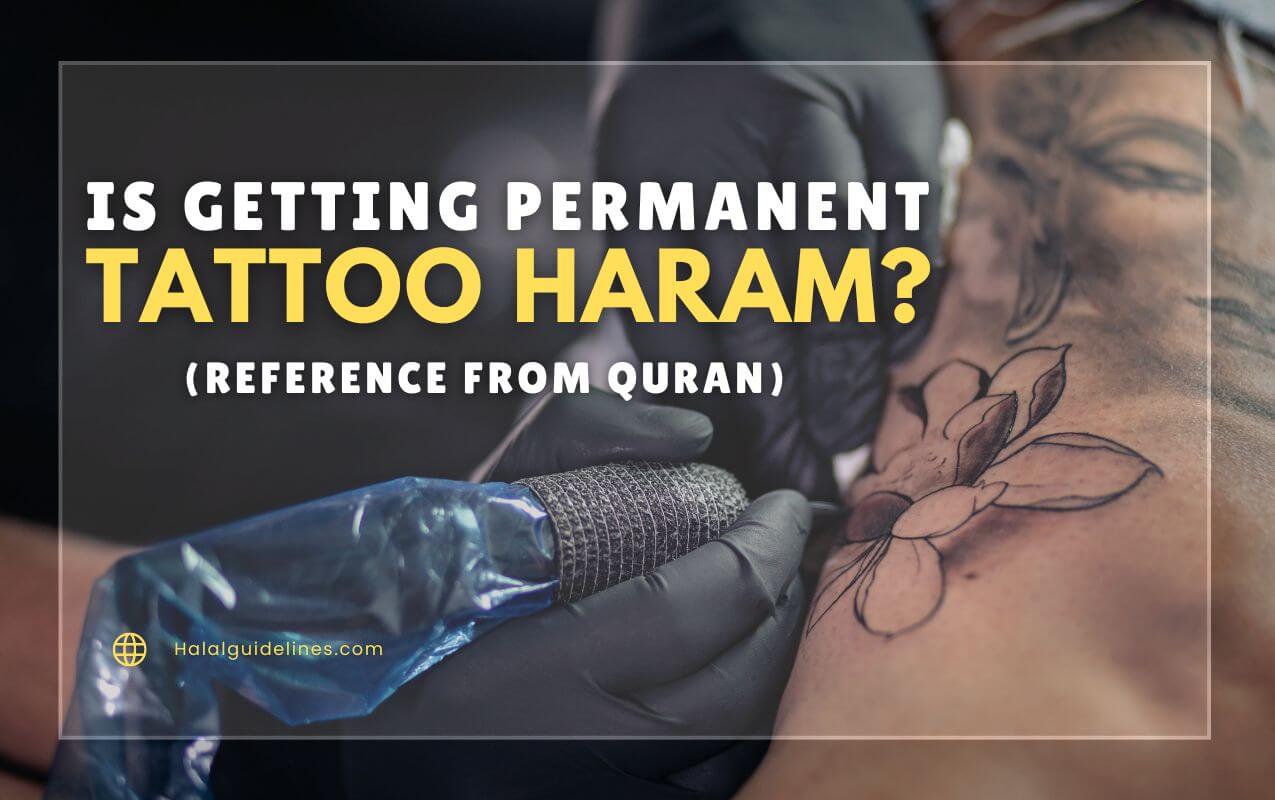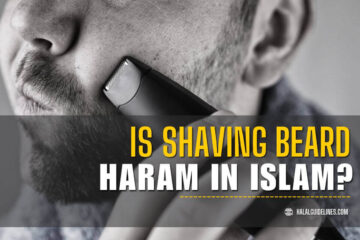Permanent ink from tattoos can interfere with proper ablution (wudu) for prayers because the ink creates a barrier on the skin that prevents water from reaching it. The common Islamic view is that tattoos are not allowed because they change the natural state of the body, cause harm, and can interfere with our religious practices.
8 More Authentic Reasons Why Tattoo is Considered Haram
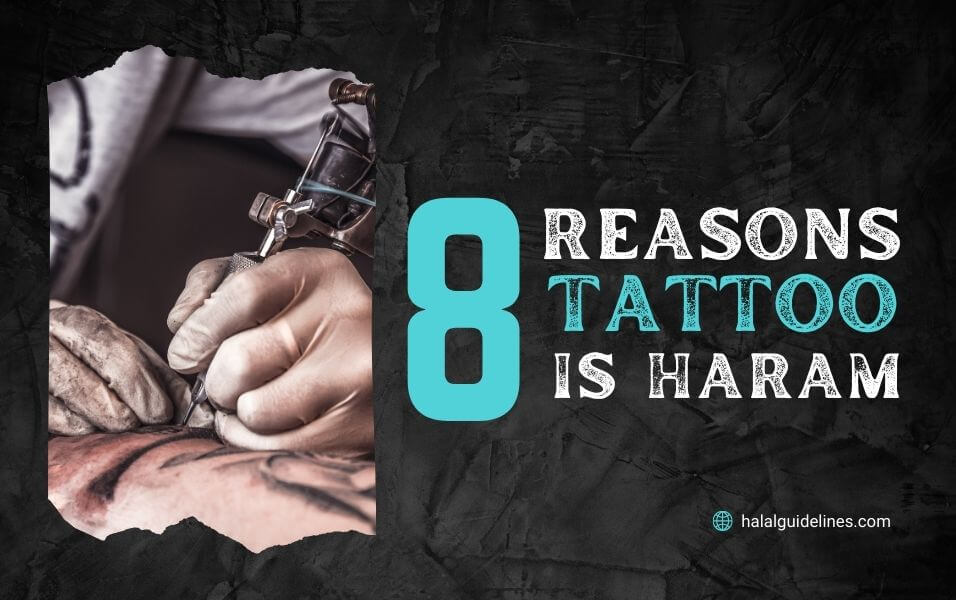
In Islam, the topic of getting tattoos has been discussed a lot, and many Muslims wonder if it’s allowed. While Islam values personal beauty and adornment, there are clear guidelines about changing one’s body.
Here are the main reasons tattoos are viewed as impermissible in Islamic Law:
1. Change In Allah’s Creation:
Islam teaches that Allah created humans in the best possible way. Getting tattoos is seen as changing this perfect creation. Tattoos suggest that we are not happy with how Allah made us, as they change our natural look.
Islam encourages us to accept and appreciate our natural form to show thankfulness for Allah’s perfect creation. Tattoos can also pose health risks, and Islam values taking care of our health. So, avoiding tattoos is a way to respect Allah’s creation and protect our well-being.
2. Causing Unnecessary Pain
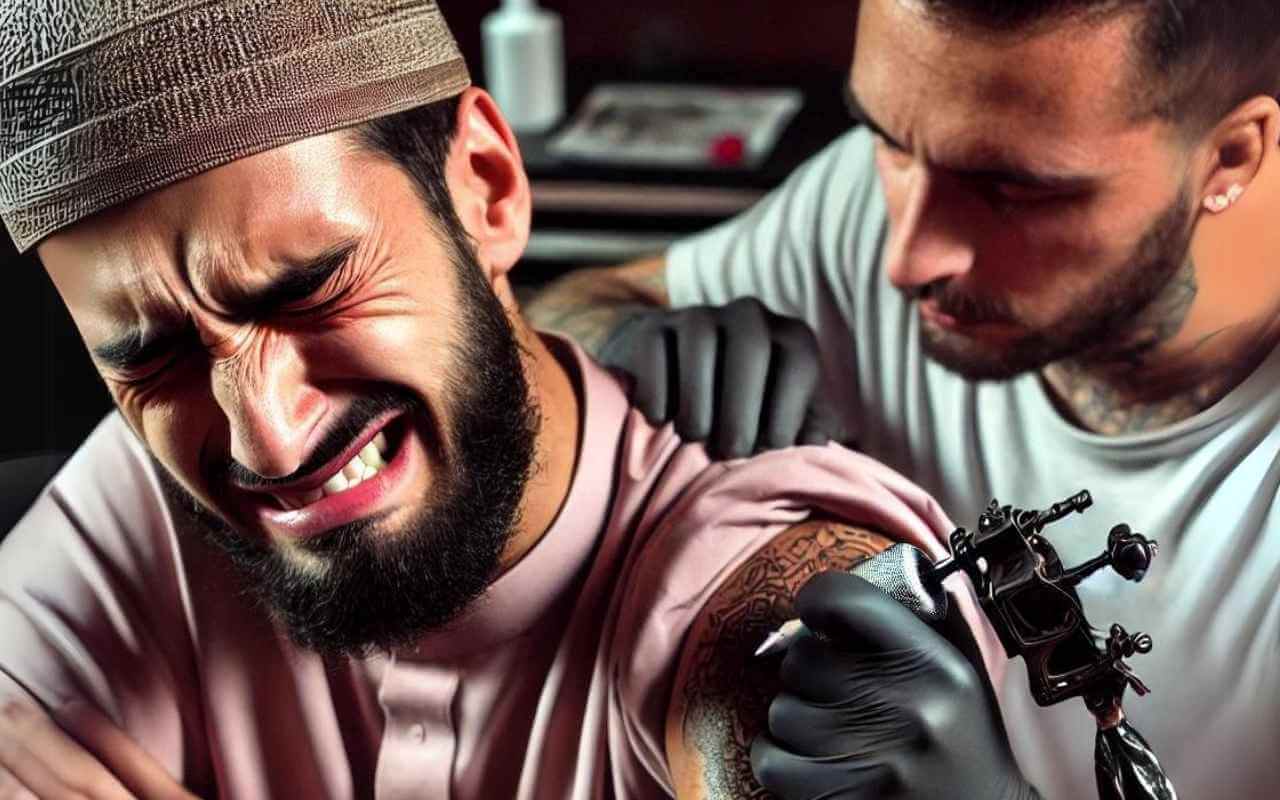
In Islam, it is forbidden to cause harm to oneself or others without a good reason. Tattooing involves using needles to pierce the skin many times, which causes pain and can lead to health problems. Doing this just for the sake of appearance goes against Islamic teachings, which highlight taking care of your health and well-being.
3. Permanent Body Modification
Unlike temporary decorations like henna, tattoos are permanent. Islam advises Muslims to avoid making permanent changes to their bodies. Tattoos are considered a form of excess, as they go beyond the natural beautification allowed in Islam. The permanence of tattoos makes it hard for a person to repent or change their mind later in life.
4. Imitating Non-Believers
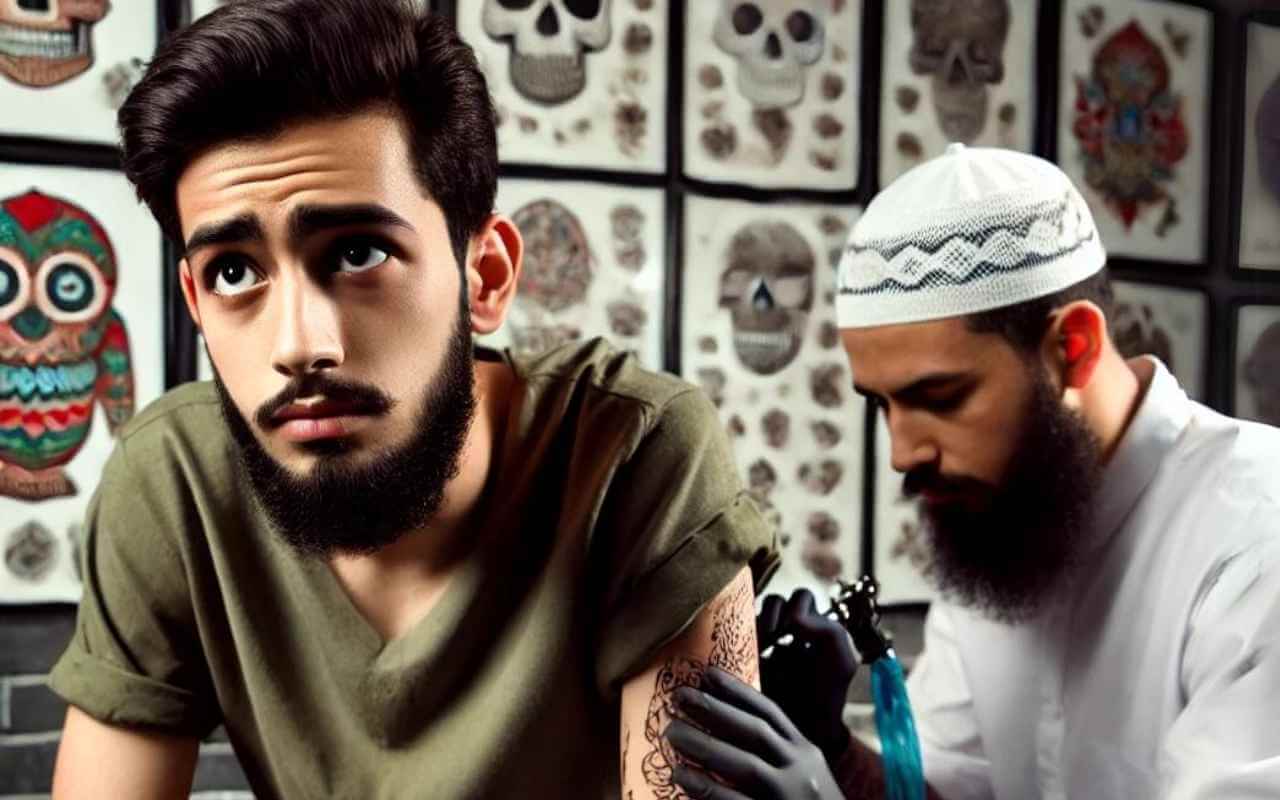
Tattoos often feature symbols from different cultures or religions, each carrying specific meanings. For Muslims, getting such tattoos could be seen as supporting beliefs that don’t align with the Islamic teachings one Allah. Even designs that seem harmless might have hidden meanings unfamiliar to Muslims, which could unintentionally affect their faith.
5. Interfering with Ritual Purification
In Islam, before prayers, We Muslims perform ritual purification called “wudu”. This cleansing is crucial for prayer, but tattoos can pose a problem. Tattoos create a barrier on the skin that stops water from reaching all parts of the body during wudu. This interference with this important religious practice is a serious concern for observant Muslims.
6. Health Risks
Islam places great importance on maintaining good health. Getting tattoos can have several health risks, such as infections, allergic reactions, and diseases that spread through the blood if clean equipment is not used.
People with tattoos also have trouble donating blood because the tattoo process can introduce harmful substances into the bloodstream. These health risks are a major reason why tattoos are considered harmful and forbidden in Islam.
7. Difficulty in Removing
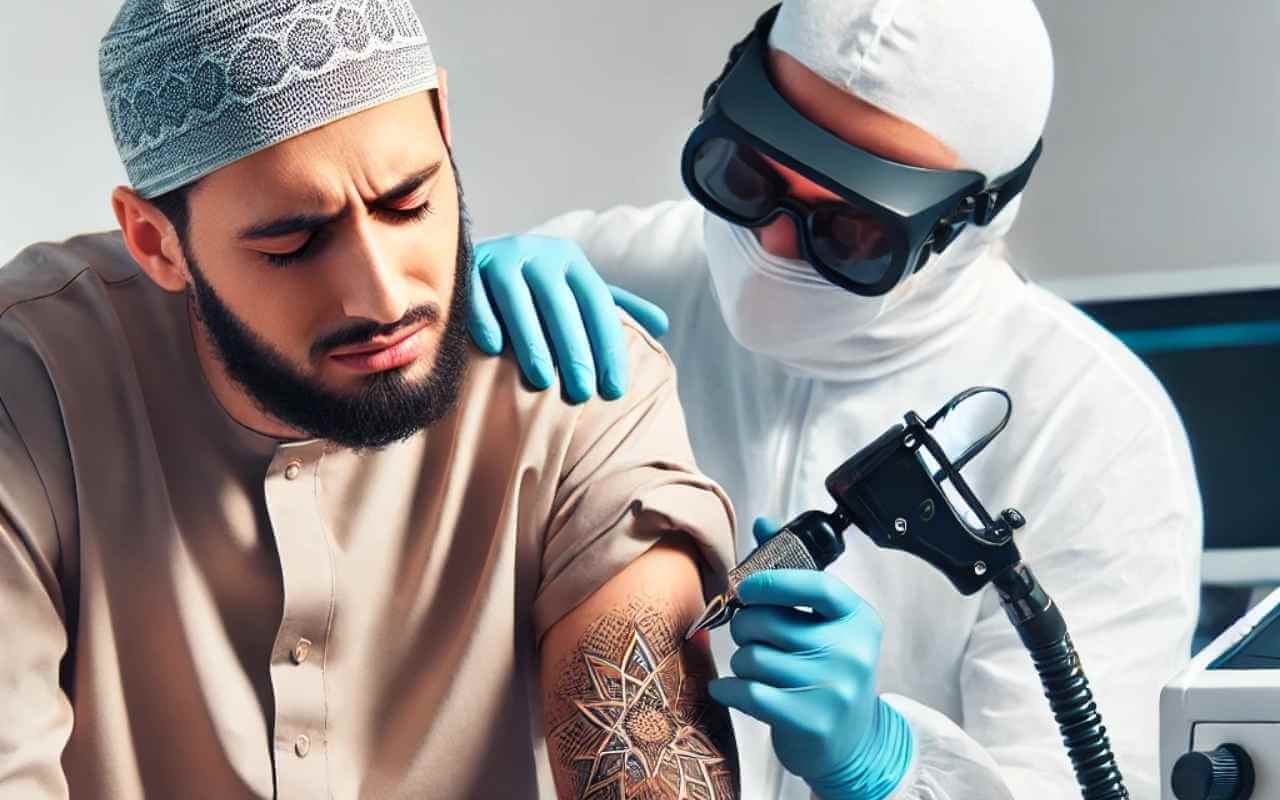
If a Muslim with tattoos later regrets their decision, removing tattoos can be extremely difficult, painful, and expensive. This difficulty in reversal is seen as problematic, as Islam encourages ease in religious practice and life in general. The permanence and difficulty of removal can be a lifelong source of regret and spiritual discomfort.
More related articles for you:
8. Concerns About Dying with Tattoos
In Islam, many believe we should return to Allah as He made us. Having tattoos when dying might be a problem on Judgment Day. Some worry that Allah might ask about these body changes. This is why Muslims are told not to get tattoos. If someone has tattoos, they should say sorry to Allah and think about removing them if they can.
These reasons can help Muslims make informed decisions about tattoos in light of our faith. While personal choice ultimately remains with the individual, it’s important to consider these religious perspectives. As Muslims we are encouraged to seek beauty and self-expression through means that align with Islamic principles, fostering both physical and spiritual well-being.
Is Getting a Tattoo an Unforgivable Sin in Islam?

Many Muslims wonder about the seriousness of getting tattoos in their faith. While tattoos are widely considered haram (forbidden) in Islam, they are not classified as unforgivable sins. The only sin generally considered unforgivable in Islam is shirk (associating partners with Allah). The prohibition against tattoos comes from hadiths where the Prophet Muhammad (peace be upon him) spoke against the practice.
If a Muslim gets a tattoo, they can seek Allah’s forgiveness through sincere tawbah (repentance). For those who obtained tattoos before converting to Islam, sincere conversion wipes away past sins, and they aren’t required to remove existing tattoos.
Islam teaches that making mistakes is human, but seeking forgiveness and improvement is divine. The Prophet Muhammad (peace be upon him) said, “All the sons of Adam are sinners, but the best of sinners are those who repent often.”
Quran and Hadith References on Tattoos
When it comes to tattoos, Muslims often look to the Quran and Hadith for guidance. These sacred texts are the foundation of Islamic teachings. While the Quran doesn’t directly mention tattoos, there are Hadiths that talk about them.
Here are what these sources say about tattoos below:
Quranic Verse on Changing Anything in Human Body:
The Quran doesn’t specifically mention tattoos, but this verse is often used in discussions about changing one’s body:
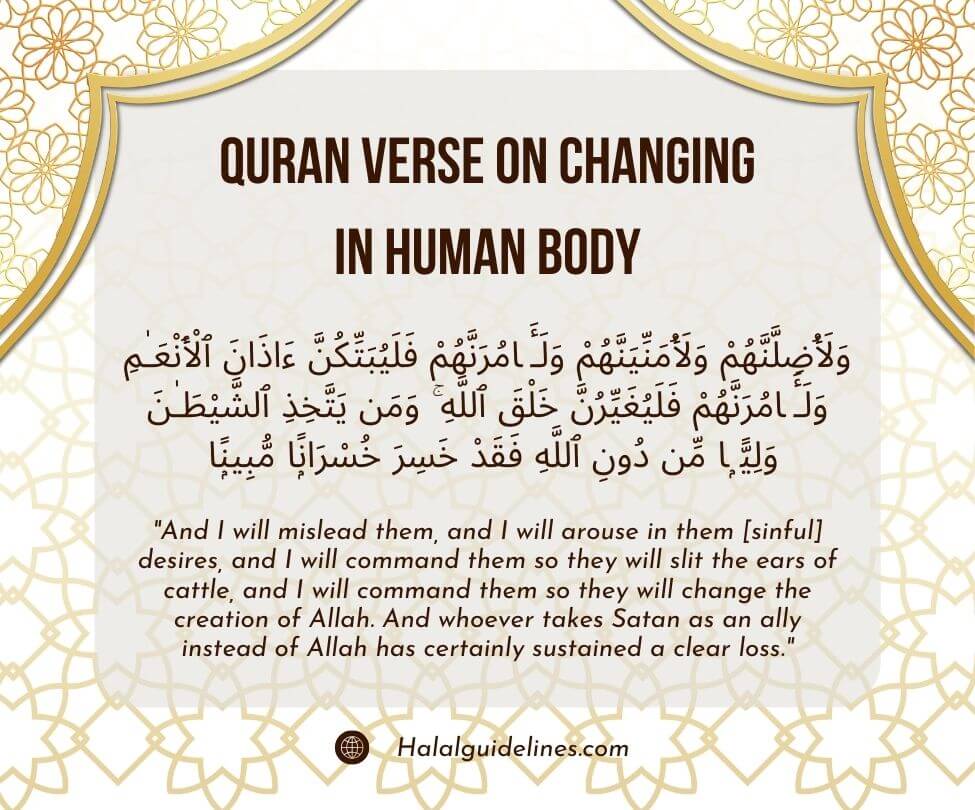
وَلَأُضِلَّنَّهُمْ وَلَأُمَنِّيَنَّهُمْ وَلَـَٔامُرَنَّهُمْ فَلَيُبَتِّكُنَّ ءَاذَانَ ٱلْأَنْعَـٰمِ وَلَـَٔامُرَنَّهُمْ فَلَيُغَيِّرُنَّ خَلْقَ ٱللَّهِ ۚ وَمَن يَتَّخِذِ ٱلشَّيْطَـٰنَ وَلِيًّۭا مِّن دُونِ ٱللَّهِ فَقَدْ خَسِرَ خُسْرَانًۭا مُّبِينًۭا
“And I will mislead them, and I will arouse in them [sinful] desires, and I will command them so they will slit the ears of cattle, and I will command them so they will change the creation of Allah. And whoever takes Satan as an ally instead of Allah has certainly sustained a clear loss.”
Reference: Ayah an-Nisa (4:119)
This verse talks about changing Allah’s creation. Some scholars say this includes tattoos because they permanently change how our bodies look. They believe Allah made us perfect, so we shouldn’t change our appearance in big ways.
Hadith References on Having Tattoo:
In this Hadith Prophet Muhammad (peace be upon him) spoke against tattoos. He warned both the person giving tattoos and the person getting them. This is why many Muslims believe tattoos are not allowed in Islam.
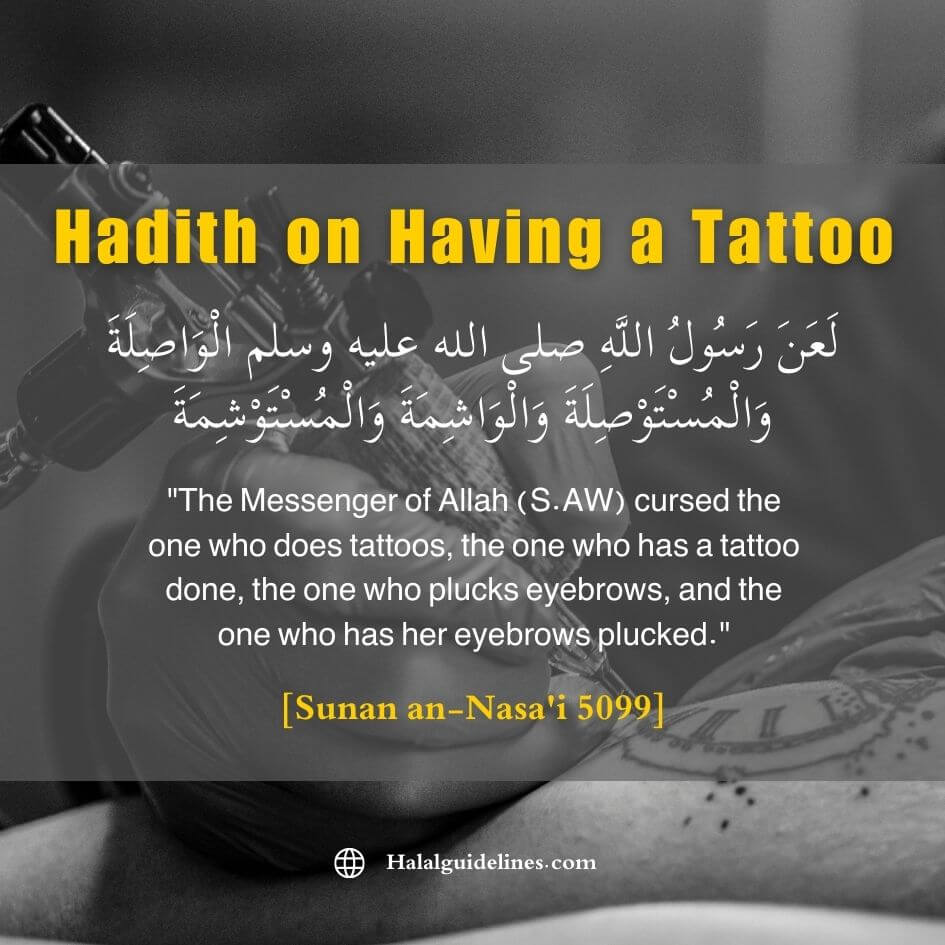
لَعَنَ رَسُولُ اللَّهِ صلى الله عليه وسلم الْوَاصِلَةَ وَالْمُسْتَوْصِلَةَ وَالْوَاشِمَةَ وَالْمُسْتَوْشِمَةَ
“The Messenger of Allah (S.AW) cursed the one who does tattoos, the one who has a tattoo done, the one who plucks eyebrows, and the one who has her eyebrows plucked.”
Reference: (Sunan an-Nasa’i 5099)
These references from the Quran and Hadith help Muslims understand the Islamic view on tattoos. While the Quran doesn’t directly mention tattoos, the idea of not changing Allah’s creation is important. The Hadiths are clearer, showing that Prophet Muhammad discouraged tattoos. Muslims use these teachings to guide their decisions about body art.
Islamic Scholars Opinions on Tattoos
When it comes to tattoos in Islam, there’s no one-size-fits-all answer. Islamic scholars have studied this topic deeply, looking at the Quran, Hadiths, and Islamic principles. Their opinions help Muslims understand the issue better.
Here are some leading Islamic thinkers have to say about tattoos below:
He also advised us “Not to judge people with tattoos” as they may have gotten them before practicing Islam. He also warns against getting permanent tattoos as they can cause regret and complications like preventing blood donation.
Getting a tattoo involves putting ink under the skin, which is painful and lasts forever. Unlike makeup, which can be washed off, tattoos are permanent, making them fall under the prohibition mentioned by the Prophet.
FAQs Regarding Tattoos
Why is tattoo considered haram but not henna?
Tattoos are considered haram in Islam because they involve permanently changing the natural creation of Allah, which is seen as disrespectful. Henna, on the other hand, is temporary and only colors the surface of the skin, not altering Allah’s creation.
Is Wudu complete with fake or temporary tattoos?
Yes, Wudu (ablution) is valid with fake or temporary tattoos because they do not form a permanent barrier on the skin. Wudu requires water to touch all parts of the body that are typically washed during the cleansing ritual, and temporary tattoos do not prevent this from happening.
Is tattoo writing or the job of a tattoo artist haram?
Yes, both tattooing and the profession of a tattoo artist are considered haram in Islam. Tattooing involves permanently altering the body, which is viewed as disobeying Allah’s natural creation.
Is there forgiveness in Islam for someone who has gotten a tattoo?
Yes, Islam teaches that sincere repentance (tawbah) can lead to forgiveness from Allah for all sins, including getting a tattoo. Repentance involves feeling regret, stopping the sinful behavior, and resolving not to repeat it.
How do tattoos impact a Muslim’s spiritual life?
Tattoos are considered haram (forbidden) in Islam because they involve permanently altering Allah’s creation. They can affect a Muslim’s spiritual life by potentially hindering full participation in religious rituals like Wudu (ablution) and may cause discomfort in spiritual practices due to the permanent change to the body.
Closing Lines
Our mission is to provide support and guidance to our fellow Muslim brothers and sisters. Let us aim to avoid practices like tattoos, which are considered impermissible in Islam due to their alteration of Allah’s perfect creation. By seeking His protection from such actions, we show our commitment to living in accordance with His divine guidance.
May Allah grant us the wisdom and resilience to make choices that honor our faith and uphold the sanctity of our bodies, leading to spiritual fulfillment and closeness to Him.

